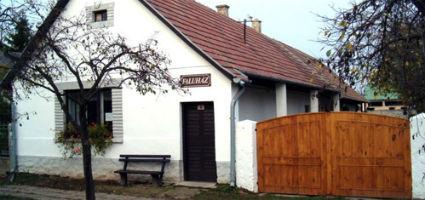2024. April 25. Thursday
Csikváry Village House - Lovasberény
 |
Address: 8093, Lovasberény Hunyadi u. 6.
Opening hours: Fri 16-18
Also at other times on prior notice (The key is at Mrs Kajári Lajos at 8 Hunyadi Street. Tel: (22) 456-224) |
The society named 'Civic Circle for the Guarding of the Village', shortly the Village Circle, was founded in Lovasberény in 1993. Their object is to search for the interesting features of the village concerning ethnography and local history, its preservation and formation of identity of youth through the material. Since 1995 a Village House is open furnished with locally collected furniture and objects.
We furnished a contemporary kitchen and room in the peasant house. We enter the house through the porch from the yard. The characteristic clay red dishes painted green and white are shown there. According to potters, the artisans of Lovasberény also worked for the guild of Csákvár.
We also show clay dishes from Upper Hungary. The most valuable piece is a Roman wick found in a vineyard. We show two old pieces used in vinicultures too.
Hemp processing was also traditional in Lovasberény. Hemp was soaked in the Hemp Lake and was processed by local housewives and weavers. Thus, we show a few equipment concerned.
Clothes of the peasantry are shown in the so-called clean room. The most valuable piece is a black velvet blouse of a bride. We also show old objects of ironing and washing in this room.
The collection also contains carved furniture. Many of the chairs belonged to the household of the Cziráky castle. The study-like room hosts books and documents concerning Lovasberény. The most interesting book is the German prayer book titled 'Himmel Schlüssel' written with gothic letters. It probably belonged to the children of a German family settling in Lovasberény in the 1720's.
Our oldest book is titled 'death Songs' from 1848. It belonged to the elder Tóth Mihály, just aqs the great Bible from 1868. The book written by Neumann Sándor in 1912 titled 'The History of the Jewish Community of Lovasberény' was written in memory of the Jews of Lovasberény.
Some documents such is the seal of Lovasberény with the inscription saying 'Fejér County Lovasberény Village 1765' are displayed on the walls in frames. In the middle the goddess of truth, Justicia, can be seen. The appearance of the goddess is unusual on seals. That it is on the seal of Lovasberény may be due to the rank of the count Cziráky Antal. The Village Circle also chose the figure of the goddess Justicia thus trying to save the memory of this interesting symbol.
We furnished a contemporary kitchen and room in the peasant house. We enter the house through the porch from the yard. The characteristic clay red dishes painted green and white are shown there. According to potters, the artisans of Lovasberény also worked for the guild of Csákvár.
We also show clay dishes from Upper Hungary. The most valuable piece is a Roman wick found in a vineyard. We show two old pieces used in vinicultures too.
Hemp processing was also traditional in Lovasberény. Hemp was soaked in the Hemp Lake and was processed by local housewives and weavers. Thus, we show a few equipment concerned.
Clothes of the peasantry are shown in the so-called clean room. The most valuable piece is a black velvet blouse of a bride. We also show old objects of ironing and washing in this room.
The collection also contains carved furniture. Many of the chairs belonged to the household of the Cziráky castle. The study-like room hosts books and documents concerning Lovasberény. The most interesting book is the German prayer book titled 'Himmel Schlüssel' written with gothic letters. It probably belonged to the children of a German family settling in Lovasberény in the 1720's.
Our oldest book is titled 'death Songs' from 1848. It belonged to the elder Tóth Mihály, just aqs the great Bible from 1868. The book written by Neumann Sándor in 1912 titled 'The History of the Jewish Community of Lovasberény' was written in memory of the Jews of Lovasberény.
Some documents such is the seal of Lovasberény with the inscription saying 'Fejér County Lovasberény Village 1765' are displayed on the walls in frames. In the middle the goddess of truth, Justicia, can be seen. The appearance of the goddess is unusual on seals. That it is on the seal of Lovasberény may be due to the rank of the count Cziráky Antal. The Village Circle also chose the figure of the goddess Justicia thus trying to save the memory of this interesting symbol.
Opening hours
Fri 16-18
Also at other times on prior notice
(The key is at Mrs Kajári Lajos at 8 Hunyadi Street. Tel: (22) 456-224)
Also at other times on prior notice
(The key is at Mrs Kajári Lajos at 8 Hunyadi Street. Tel: (22) 456-224)
Services
guided tour
In Hungarin and German
Entrance is free of charge
for everybody
Contact
| Address | 8093 Lovasberény, Hunyadi u. 6. |
| Museum manager | Deli Zsuzsanna
|
| Web |